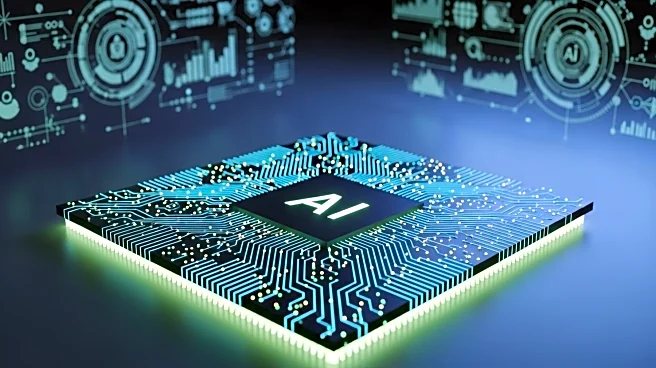What is the story about?
What's Happening?
OpenAI has entered into a significant partnership with Broadcom to develop custom AI accelerators, marking another major deal in the AI sector. This collaboration involves OpenAI designing its own chips and systems, which will be developed and deployed with Broadcom. The move is part of OpenAI's strategy to enhance its technological capabilities and reduce reliance on major chip manufacturers like Nvidia and AMD. Recently, OpenAI has been involved in several high-value deals, including a $300 billion agreement with Oracle for cloud computing services and substantial deals with Nvidia and AMD. These transactions have sparked discussions about the potential of an AI bubble, with concerns about over-investment and the sustainability of such high valuations.
Why It's Important?
The series of high-value deals by OpenAI highlights the growing influence and investment in AI technology, which is expected to drive significant economic growth. However, the rapid influx of capital into AI raises concerns about a potential bubble, reminiscent of past tech bubbles like the dotcom boom. If the AI bubble bursts, it could lead to financial losses for investors and companies heavily invested in AI. Despite these concerns, industry leaders like Jeff Bezos argue that AI will revolutionize industries globally, improving productivity and quality across various sectors. The development of AI hardware and systems could have lasting impacts, even if the bubble bursts, similar to the legacy left by the dotcom crash.
What's Next?
The future of AI investment and development remains uncertain, with potential consequences if the bubble bursts. Stakeholders, including investors and tech companies, may need to reassess their strategies and prepare for possible market corrections. The ongoing development of AI technology will likely continue to influence industries worldwide, with companies integrating AI into their operations. Observers will be watching for signs of market instability and the impact of these large-scale investments on the broader economy.
Beyond the Headlines
The ethical and cultural implications of AI's rapid growth are significant, as the technology becomes more integrated into daily life and business operations. Concerns about data privacy, job displacement, and the ethical use of AI are likely to intensify as the technology advances. Long-term shifts in how industries operate and the role of AI in society could be profound, necessitating discussions on regulation and responsible AI development.














